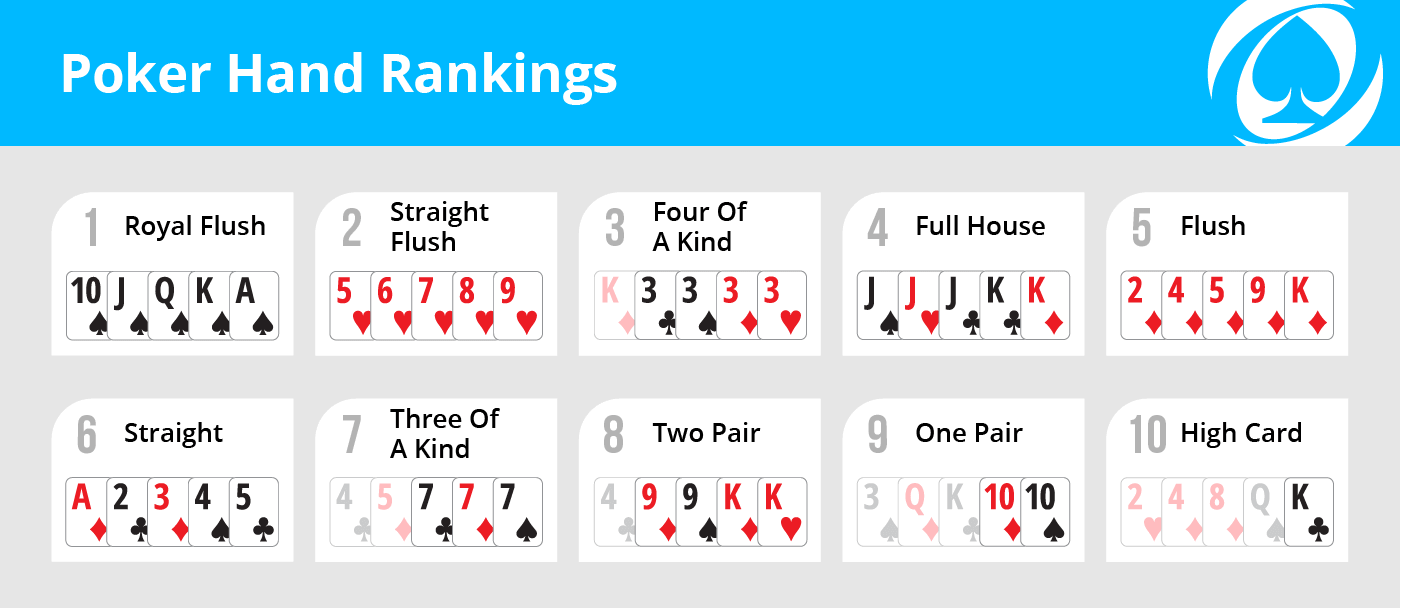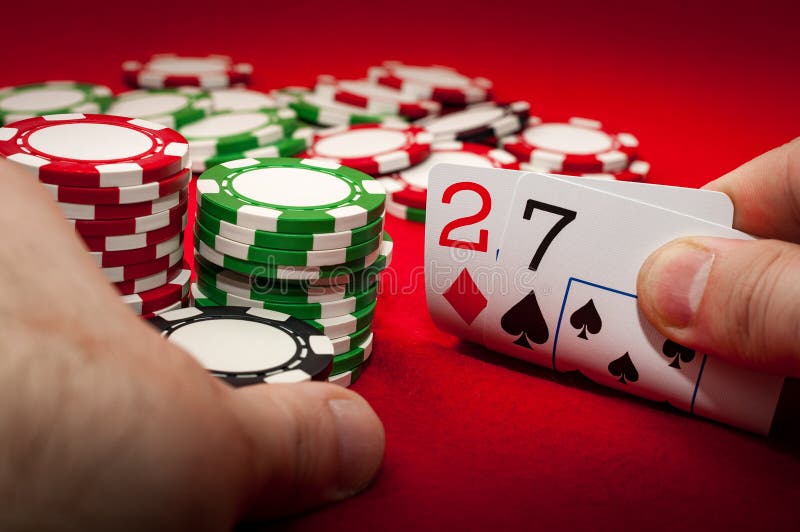Worst Cards In Poker
Ritz Poker Playing Cards. Ritz Poker Playing Cards are 100% plastic and are washable. They come in a plastic case that is clear on the top, so you can clearly see the cards displayed. A blue deck and a red deck sit side-by-side in the case, and they come in a very simple and classic design with a. The is the best possible hand you can get in standard five-card Poker is called a royal. Darvin ‘I got the nuts’ Moon (2009) 2nd place $5.4 million. I mean no disrespect to Darvin by putting.
Four Card Poker is a casinocard game similar to Three Card Poker, invented by Roger Snow and owned by Shuffle Master.[1]
Biggest Card In Poker
Description of play[edit]
The player can place an ante bet or an 'Aces Up' bet or both. Five playing cards are dealt to the player, while the dealer is dealt five cards face down and a sixth card face up. Both the player and the dealer make their best four-card hands. The dealer's advantages are in having an extra card and the fact that if the player folds, he will lose his ante, even if his hand turns out to be better than the dealer's.
After seeing their cards and the dealer's face up card, the player can opt to fold the ante bet, in which case the player loses it, or play by betting 1-3 times their ante. Unlike Three Card Poker and some other games, the dealer always qualifies (plays). If the player ties or beats the dealer, the player is paid the amount bet. A bonus is paid if the player has a three of a kind (2-1 for the original ante bet only), straight flush (20-1), or four of a kind (25-1). This bonus is paid out even if the dealer's hand is better than the player's; however, in this situation, the player would still lose their ante and play bets.
The Aces Up bet depends solely on the player's hand. If the player has a pair of aces or better, they win, otherwise they lose. The dealer's hand is immaterial. The payout for a win can range from 1-1 for a pair of aces to 50-1 for four of a kind, the best possible hand. Various payout variations are possible, depending on the casino, resulting in a house edge ranging from 1.98% to 6.15%.[2]
Rank of hands[edit]
The possible four-card hands are (from best to worst):
References[edit]
- ^ShuffleMaster: Four Card Poker
- ^Wizard of Odds: Four Card Poker
External links[edit]
Here are my top 5 worst poker players to ever make a WSOP Main Event final table (post 2003)
With all the debate currently going on in the poker community about the skill (or lack thereof) of current WSOP champion Qui Nguyen, I thought I’d take a look at some of the worst poker players to ever make a WSOP Main Event final table. For this list we are only considering players who made a final table after the poker boom in 2003. Prior to this time, poker was not mainstream and the fields were very small. Also, even the good players weren’t very good by today’s standards, so if we included pre-2003 qualifiers this list would be full of them. I wanted to make a list of the worst champions of the modern era, but to be honest there are only 2 champions that I would consider to be bad players (they both make the list) Here are my top 5 worst poker players to ever make a WSOP Main Event final table (post 2003):
5.)Phil Hellmuth
Just kidding, he’s never made a final table in the modern era. But if he did, he’d definitely be on top of this list.
5.) Jamie Gold (2006), 1st place $12 million
Jamie Gold’s run in 2006 was one of the most amazing things you’ll ever see in a poker tournament. He caught every card for 7 days and easily won what was then the biggest prize in poker history ($12 million). He also introduced a very unorthodox style of talking during the hand. Quite often he would tell the truth and actually tell his opponents what cards he had. He would then mix in a few lies from time to time and just confused the hell out of people. It also didn’t hurt that he had the best hand most of the time. Anyway, Gold makes this list because his victory can be attributed mostly to luck. Also, his table talk strategy proved to be ineffective over the long run, as he hasn’t achieved any significant poker success since this tournament.
:max_bytes(150000):strip_icc()/close-up-of-poker-player-s-hands-157418183-5c42653146e0fb00010f505c.jpg)
4.) Dennis Phillips (2008), 3rd Place $4.5 million
Dennis Phillips is a regular guy and a solid poker player. There’s nothing clever or creative about his game, but he knows enough of the basics to avoid huge mistakes against average players. He rode a huge streak of luck to make the final table in 2008 and came close again in 2009 (45th place). This hand below, (featured on The Poker Guys’ show ‘The Breakdown’) against Ivan Demidov shows how over matched he was against quality players:
3.) Jerry Yang (2007), 1st Place $8.4 million
Jerry Yang came from nowhere in 2007 to take down the Main Event championship and $8.4 million. Like all amateurs who make a score like this, Yang was extremely lucky throughout the tournament. He survived multiple all-ins with the worst hand and got a miraculously bad fold from Lee Childs at the final table (more on that in a second) when a call would have sent him home in 9th place. Yang has had a couple decent scores since his big win, but he’s been a losing player overall during that time. Former WSOP champ Joe Hachem once said that Yang’s win (along with Gold’s) ‘destroyed the legacy of the World Series championship’ implying that the title is now meaningless since such unskilled players were able to win.

2.) Lee Childs (2007), 7th place $705K
In fairness to Childs, he probably has the most consistent record of poker success of any player on this list. However, he makes the number 2 spot here because of how badly he played at the WSOP Main Event final table in 2007. At around 7:30 in the video above you can watch the hand for yourself. He folds QQ against Jerry Yang’s all-in bet with JJ on a flop with 3 low cards. Yang had been playing very aggressively and was capable of making this bet with many different hands, almost all of which Childs’ QQ had crushed. Furthermore, earlier in the tournament Childs incorrectly folded KK against Yang and showed his cards. So to sum up, Yang was a very aggressive player who knew that Childs would fold big hands. Given this dynamic, Childs’ fold of QQ here is likely 100% due to fear. If he calls, he’s chip leader and Yang is out of the tournament. Instead, he makes the scared fold and ends up goign out in 7th place for $705k while Yang wins the whole thing for $8.4 million.
1.) Darvin ‘I got the nuts’ Moon (2009) 2nd place $5.4 million

I mean no disrespect to Darvin by putting him on top of this list. But the fact remains, he had no business making a WSOP final table. His run of luck in this tournament is something you have to see to believe. His understanding of the strategic aspect of this game is extremely low, and to his credit he openly admits this. At one point he tries to bluff and gets re-raised all-in. He’s getting 7 to 1 odds on a call but only has king high. The funny thing is that after he folds he walks over to his wife and lies to her, saying that he had QQ and folded because he thought his opponent had a flush draw. That’s right, he thought folding the best hand while getting 7 to 1 odds on his money would make him look good. Here’s the hand:
Photo Source: http://www.cardplayer.com/poker-players/142462-darvin-moon
Wild Cards In Poker
Psssst! We’re on YouTube – see, what we do there.